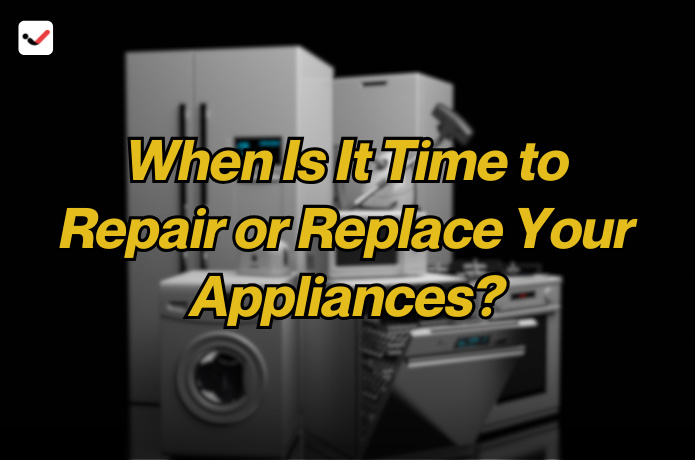When Is It Time to Repair or Replace Your Appliances?
When Is It Time to Repair or Replace Your Appliances?

Household appliances are essential for our daily lives. From refrigerators keeping food fresh to washing machines cleaning our clothes, these devices help us save time and effort. Over time, however, appliances can show signs of wear and tear. When they stop working as expected, homeowners often face a difficult decision: repair or replace? Making the right choice can save money, reduce frustration, and ensure your home runs smoothly.
Knowing when to repair or replace an appliance depends on factors like the age of the device, repair costs, and energy efficiency. By understanding these key considerations, you can make a smart decision that aligns with your budget and long-term needs. This article will guide you through the signs to watch for, help you weigh the costs and benefits, and explore the impact of energy efficiency on your choices.
Signs Your Appliance Needs Attention
Frequent Breakdowns
If your appliance requires repairs more often than usual, it could signal that the device is nearing the end of its useful life. For example, a dishwasher that constantly leaks or a refrigerator that struggles to maintain a consistent temperature may be costing you more in repairs than it's worth.
Unusual Noises
Appliances are designed to operate quietly or with minimal noise. Grinding, buzzing, or rattling sounds often indicate internal issues that need immediate attention. These noises could point to mechanical problems or worn-out components, which may require a technician to assess.
Higher Energy Bills
Older appliances often lose efficiency over time, leading to increased energy consumption. If you notice a sudden spike in your utility bills, it might be due to an overworked appliance. Replacing an inefficient device with a modern, energy-efficient model can save money in the long run.
The 50% Rule for Repairs
When deciding whether to repair or replace an appliance, many experts recommend the 50% rule. This means if the cost of repairing your appliance exceeds 50% of the cost of a new one, it’s better to replace it. For example, if fixing your washing machine will cost $400 and a new one costs $700, replacing the machine may be the smarter financial choice.
Applying this rule helps you balance repair costs with the potential benefits of a newer model. Keep in mind that some appliances, like refrigerators and ovens, often last longer and may justify repair expenses if they’re not too high.
Age of the Appliance Matters
Average Lifespan of Appliances
Every appliance has a typical lifespan. Knowing these averages can help you decide whether repair or replacement is the better option:
Refrigerators: 10–15 years
Dishwashers: 8–12 years
Washing Machines: 8–12 years
Dryers: 10–13 years
Ovens: 10–15 years
If your appliance is near or beyond its expected lifespan, replacing it is often a better long-term investment.
Technology Advancements
Older appliances may lack modern features like energy-saving modes or smart home connectivity. If upgrading to a newer appliance offers significant benefits in convenience or efficiency, it may be worth the investment, even if the old appliance is still functional.
Energy Efficiency: A Key Consideration
Energy-efficient appliances not only reduce electricity costs but also help lower your carbon footprint. Look for appliances with the ENERGY STAR label, which indicates they meet strict efficiency guidelines set by the U.S. Environmental Protection Agency. Upgrading to energy-efficient models can lead to significant savings over time, especially for high-energy-use appliances like refrigerators, air conditioners, and water heaters.
If your current appliance consumes excessive energy compared to newer models, it’s a sign that replacing it could be beneficial. Modern appliances often pay for themselves in savings within a few years.
Repair Tips to Extend Appliance Life
If you decide to repair, proper maintenance can extend the life of your appliance and delay the need for replacement. Here are some tips:
Regular Cleaning: Clean filters, vents, and coils to ensure efficient operation.
Timely Repairs: Address small problems early to prevent larger, costlier issues.
Follow Manufacturer Guidelines: Use the appliance as recommended and avoid overloading or misusing it.
Simple upkeep can maximize the value of your appliances, giving you more time before facing the repair-or-replace dilemma again.
When Replacement Is the Best Option
Safety Concerns
If an appliance poses safety risks, such as sparking wires, gas leaks, or excessive heat, replacing it is the safest choice. Ignoring these problems can lead to accidents or damage to your home.
Uneconomical Repairs
When parts are hard to find or expensive, repair costs can quickly add up. In such cases, replacing the appliance might save you money in the long term. Additionally, manufacturers may stop supporting older models, making replacement the only viable option.
How to Choose a New Appliance
When replacement becomes necessary, consider these factors:
Energy Efficiency: Opt for models with high efficiency ratings to save on energy costs.
Warranty: Look for appliances with strong warranties to protect your investment.
Size and Fit: Ensure the new appliance fits your space and meets your household needs.
Reviews and Reliability: Research brands and models with a reputation for durability and performance.
Taking the time to choose the right replacement will help you avoid future headaches and ensure your new appliance serves you well for years.
Deciding whether to repair or replace an appliance can be challenging, but understanding the signs, costs, and benefits of each option makes the process easier. Pay attention to the age, efficiency, and condition of your appliances, and use the 50% rule as a guideline. Regular maintenance can help extend the life of your devices, but when repairs become too frequent or costly, it’s time to consider an upgrade.
Investing in energy-efficient appliances not only saves money but also benefits the environment. By carefully evaluating your options, you can make smart choices that keep your home running smoothly and efficiently.

